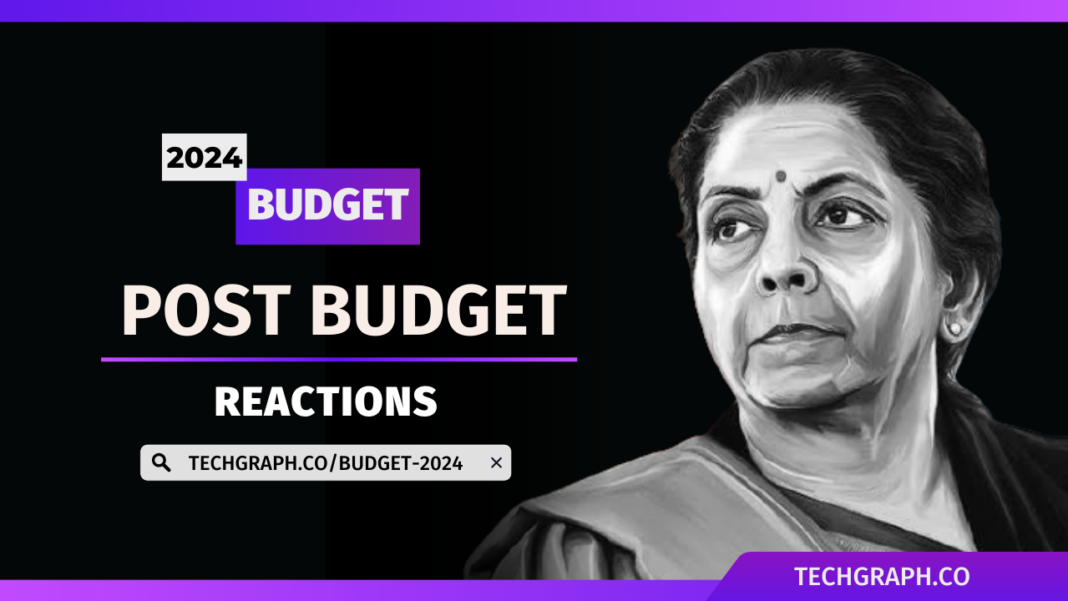In reaction to the interim budget for 2024, where Union Finance Minister Nirmala Sitharaman allocated Rs 1,20,627.87 crore to the Education Ministry, the educationalists, and leaders in the education and edtech sectors have welcomed and praised the government’s dedication to enhancing higher education and skill development standards.
Here are the insights from industry leaders:
Rohit Gajbhiye, MD & Founder, LEO1
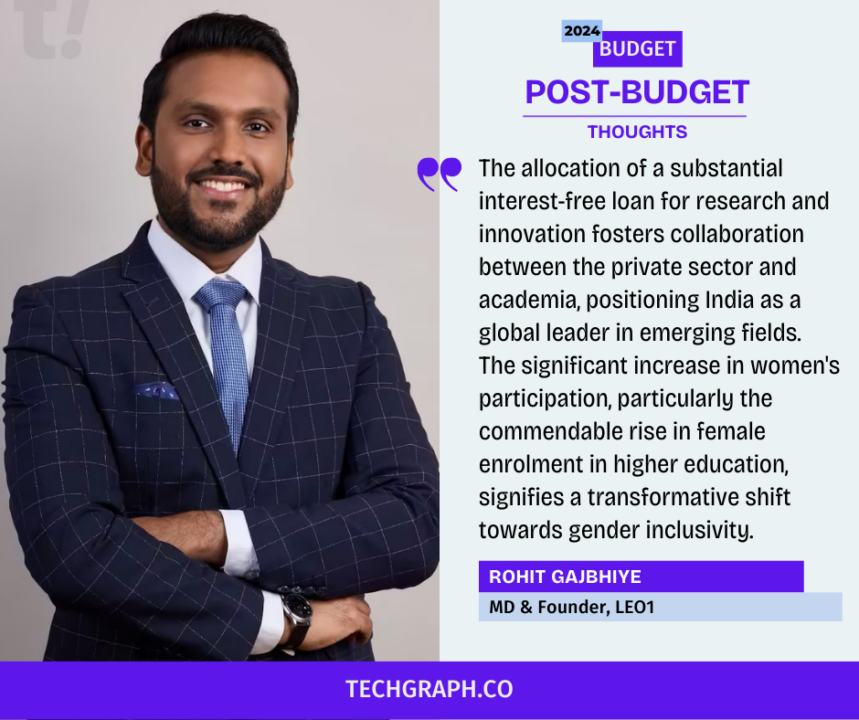
The interim budget demonstrates a visionary commitment to transforming India’s education sector. The allocation of a substantial interest-free loan for research and innovation fosters collaboration between the private sector and academia, positioning India as a global leader in emerging fields. The significant increase in women’s participation, particularly the commendable rise in female enrolment in higher education, signifies a transformative shift towards gender inclusivity.
The focus on deep-tech technologies for defense aligns education with national security needs, making the sector integral to shaping the nation’s future resilience. The budget’s emphasis on new-age technologies, data, and a scheme for deep-tech strengthens India’s position in the rapidly evolving digital landscape. Initiatives like solar-powered homes and rural job creation showcase a holistic approach, bridging the urban-rural educational divide. In essence, the budget paints a dynamic picture of a comprehensive educational ecosystem, setting the stage for a skilled, empowered, and forward-looking India on the global stage.
Beas Dev Ralhan, CEO, Next Education
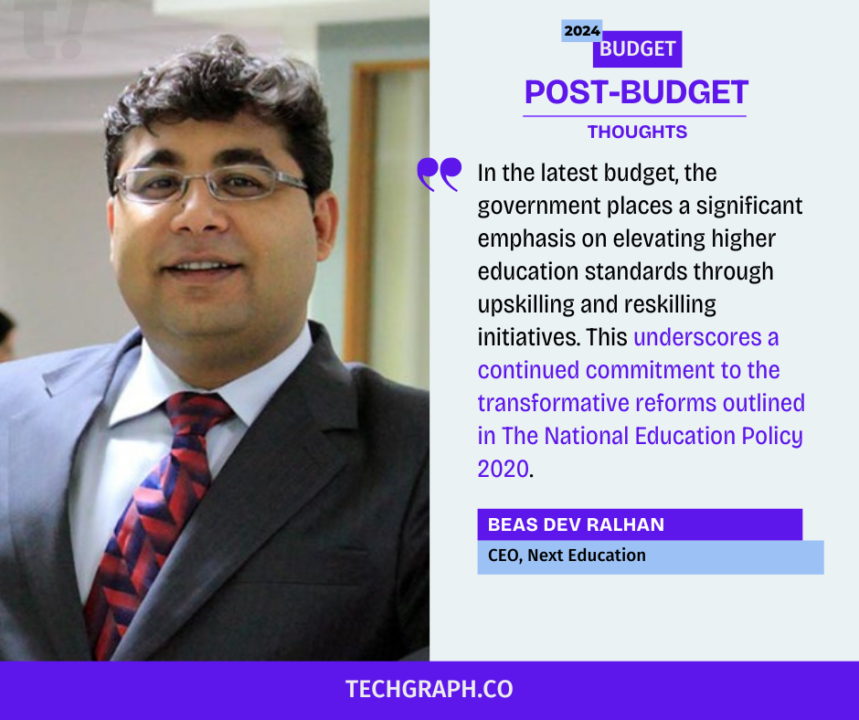
In the latest budget, the government places a significant emphasis on elevating higher education standards through upskilling and reskilling initiatives. This underscores a continued commitment to the transformative reforms outlined in The National Education Policy 2020. The substantial allocation, with the Education Ministry receiving its highest-ever budget of Rs 1,20,627.87 crore, reflects a prioritization of educational excellence.
While PM Schools for Rising India (PM SHRI) plays a pivotal role in delivering quality education and fostering holistic development, it is crucial to address the persistent challenge of unemployable youth. Urgent attention is needed to realign our education system with market demands, ensuring that our youth not only receive theoretical knowledge but also acquire practical skills. This strategic focus is essential to empower the younger generation to contribute meaningfully to the progress of our nation.
Dhruv Ahuja, CEO & Founder, Ikidz
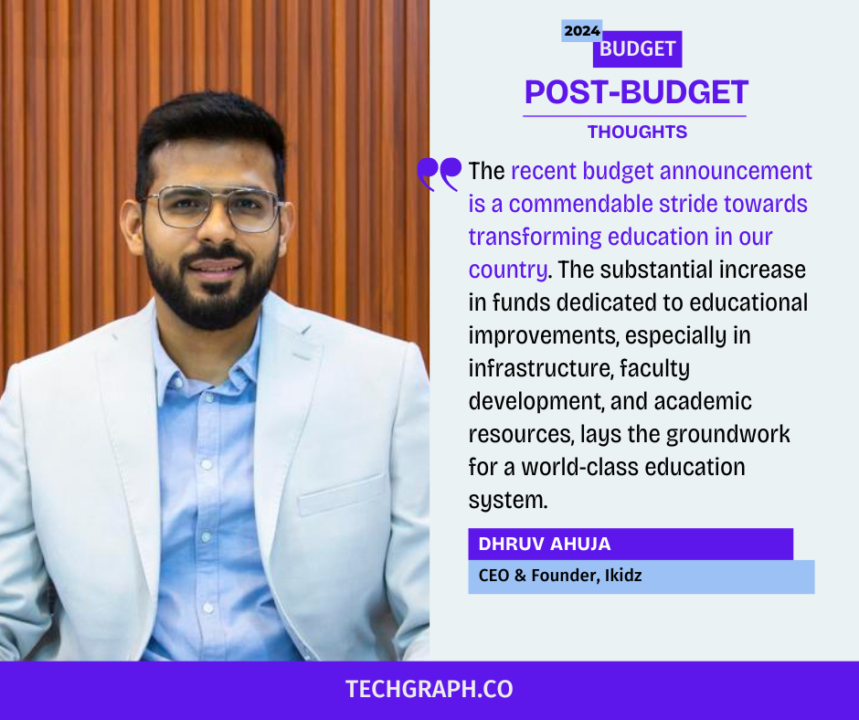
The recent budget announcement is a commendable stride towards transforming education in our country. The substantial increase in funds dedicated to educational improvements, especially in infrastructure, faculty development, and academic resources, lays the groundwork for a world-class education system. The pronounced focus on technology integration, supported by allocated funds for digital infrastructure and e-learning resources, ensures that our institutions stay at the forefront of educational innovation.
Skill development takes a pivotal role in industry-aligned programs, enhancing students’ practical skills and employability. Increased funding for research projects and interdisciplinary collaborations positions our institutions as hubs of knowledge creation. Anticipated higher allocations for scholarships and financial aid reflect a commitment to inclusivity. Adequate funding for modern facilities, including smart classrooms, is vital for creating an optimal learning environment. Hopes for regulatory reforms signal a dedication to simplifying administrative processes and fostering innovation. The budget showcases a visionary approach to nurturing a transformative and globally competitive education system.
Shantanu Rooj, CEO & Founder, TeamLease Edtech
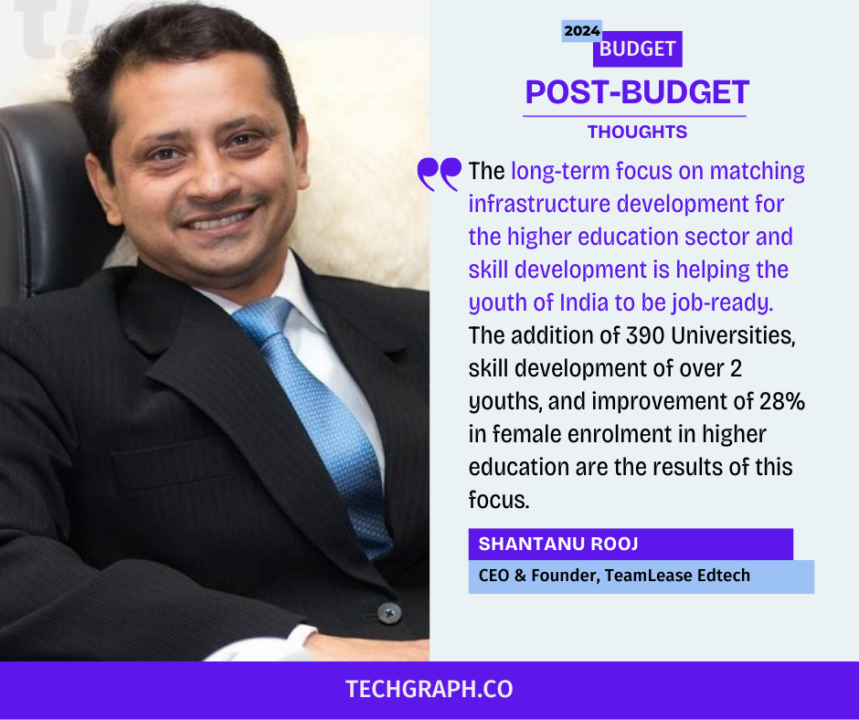
The long-term focus on matching infrastructure development for the higher education sector and skill development is helping the youth of India to be job-ready. The addition of 390 Universities, skill development of over 2 youths, and improvement of 28% in female enrolment in higher education are the results of this focus. This will yield rich dividends for the industry and economy at large.’
Neeti Sharma, Co-Founder, TeamLease Edtech
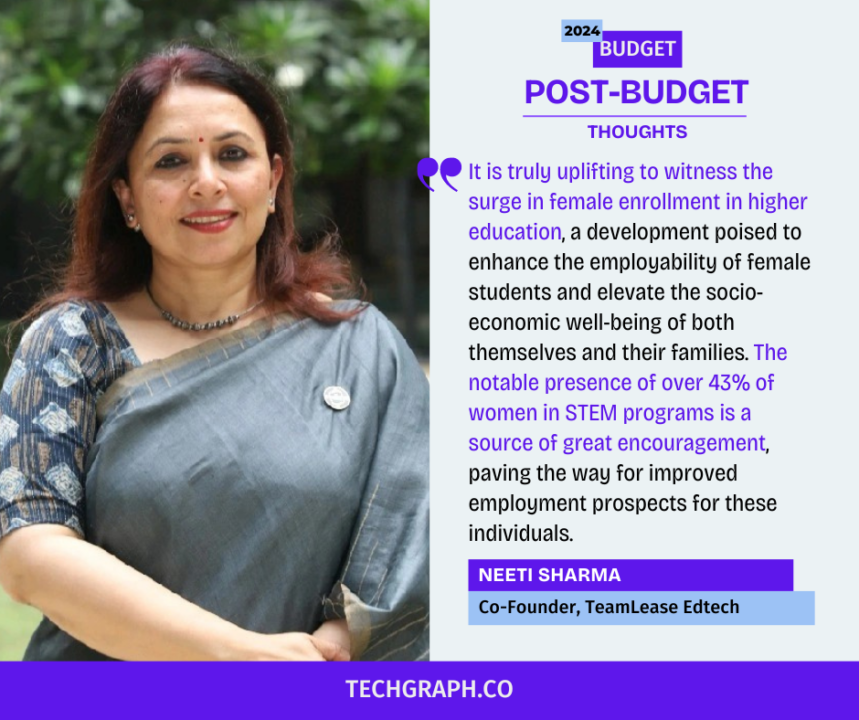
It is truly uplifting to witness the surge in female enrollment in higher education, a development poised to enhance the employability of female students and elevate the socio-economic well-being of both themselves and their families. The notable presence of over 43% of women in STEM programs is a source of great encouragement, paving the way for improved employment prospects for these individuals and serving as a catalyst to inspire countless others. The ongoing governmental backing, particularly in sectors such as EV manufacturing, promises the generation of many new job opportunities that would require diverse skills and experience levels.
Pratik Kapasi, Founder, HeyCoach
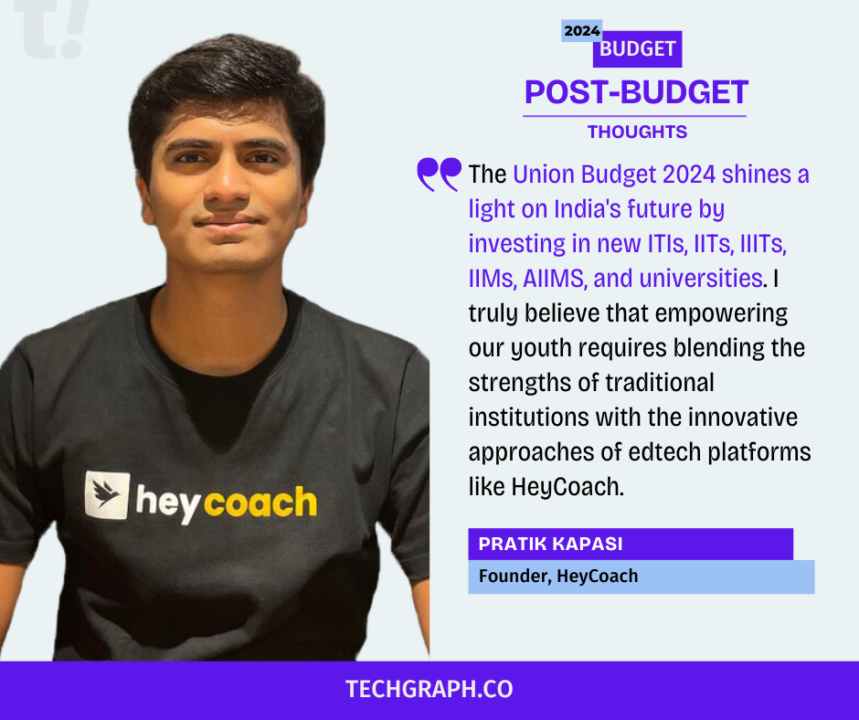
The Union Budget 2024 shines a light on India’s future by investing in new ITIs, IITs, IIITs, IIMs, AIIMS, and universities. I truly believe that empowering our youth requires blending the strengths of traditional institutions with the innovative approaches of edtech platforms like HeyCoach. This combination nurtures not only academic excellence but also vital skills such as emotional intelligence, creativity, and adaptability. Post-academia, the focus should pivot towards nurturing problem-solving abilities and resilience to confront future challenges head-on.
Edtech platforms extend beyond a supplementary role; they act as pivotal agents of transformation. They democratize access to the best education, customize learning to meet individual needs, and gear students up for real-world challenges. These are the attributes that will sculpt the leaders, innovators, and thinkers of the future. In Conclusion, the role of education is about cultivating a society that values critical thinking, embraces diversity, and is committed to solving complex global issues. Institutions and ed-tech platforms must work in concert to empower the youth, not just as job seekers, but as job creators, thought leaders, and catalysts for change.
Radhieka Mehta, CEO & Head of Campus (Mumbai), SP Jain School of Global Management
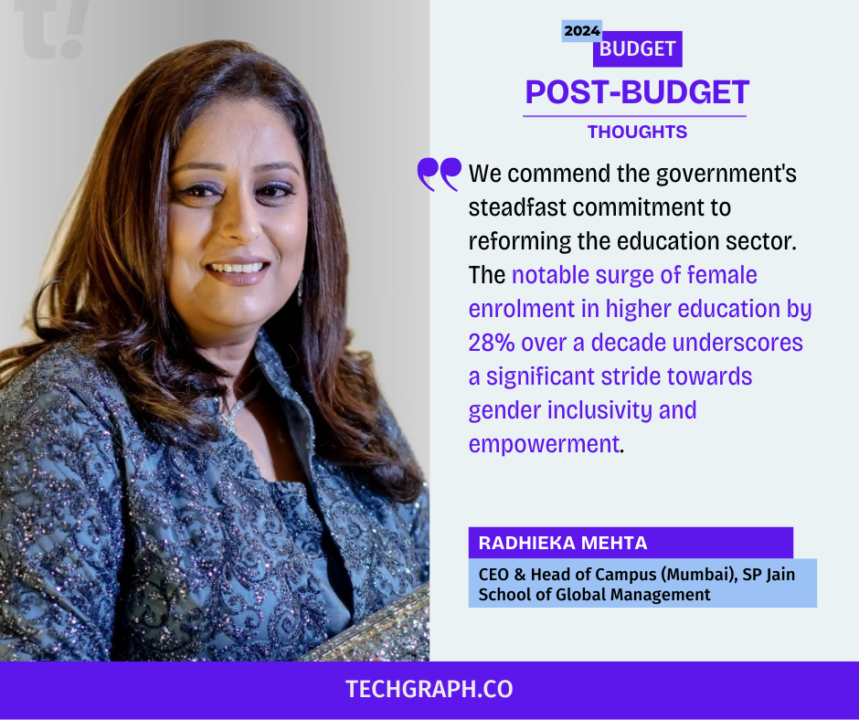
We commend the government’s steadfast commitment to reforming the education sector. The notable surge of female enrolment in higher education by 28% over a decade underscores a significant stride towards gender inclusivity and empowerment. This trend bodes well for the future, reflecting positively on the increasing participation of women in the workforce. The establishment of prominent educational institutions and universities further underscores the government’s commitment to providing quality education and fostering innovation. These initiatives align with our mission of nurturing global leaders, and we look forward to contributing to India’s journey toward excellence in education and skill development
PK Samal, Managing Director, American EduGlobal School
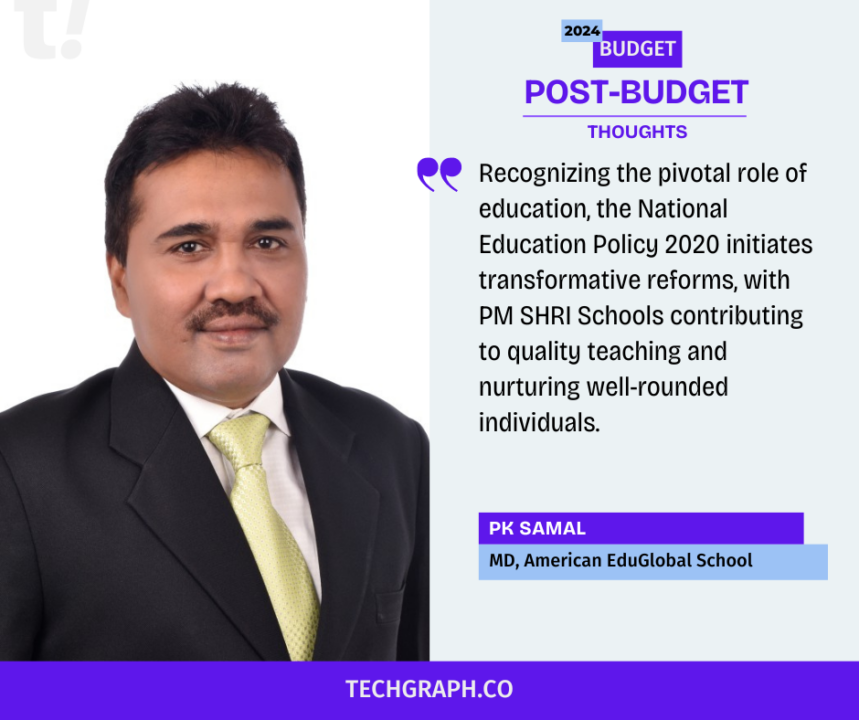
The government’s decade-long commitment to women’s empowerment is evident in the momentum gained through entrepreneurship and enhanced ease of living. Recognizing the pivotal role of education, the National Education Policy 2020 initiates transformative reforms, with PM SHRI Schools contributing to quality teaching and nurturing well-rounded individuals. We commend the Finance Minister ‘Nirmala Sitharaman’ for these visionary steps towards equipping the youth and fostering holistic development. We believe 2024-25 is an overall balanced budget, Embracing what PM Modi has said ‘Ab Kartavya Kaal Ka Samay Agya Hai,’ we believe the collective citizen initiative will propel India to top developed status in 5 years.
Dr. Yajulu Medury, Vice Chancellor, Mahindra University
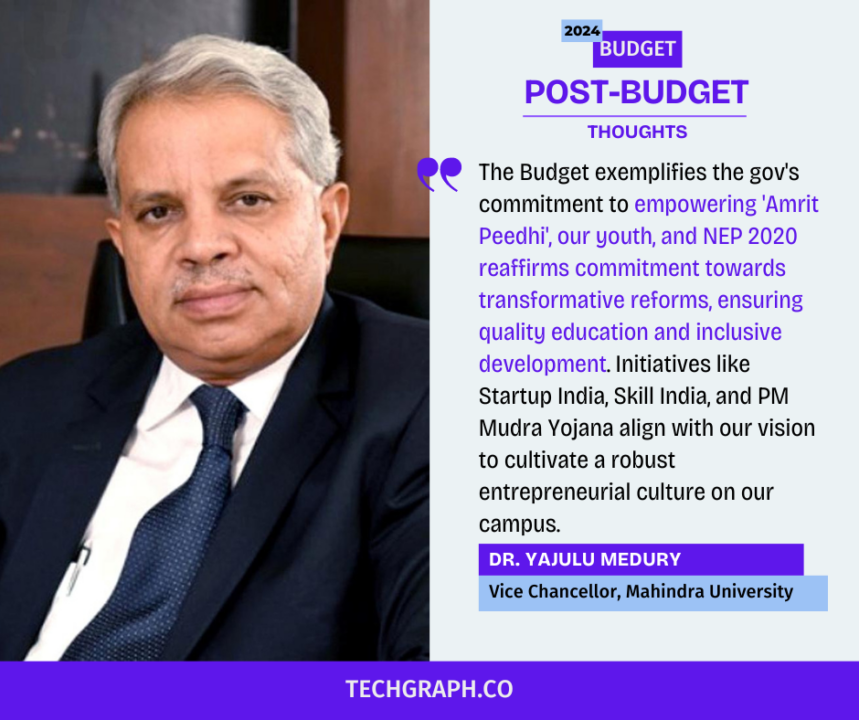
The Budget 2024 exemplifies the government’s commitment to empowering ‘Amrit Peedhi’, our youth, and National Education Policy 2020 reaffirms commitment towards transformative reforms, ensuring quality education and inclusive development.
Initiatives like Startup India, Skill India, and PM Mudra Yojana align with our vision to cultivate a robust entrepreneurial culture on our campus, reiterating our focus on growing the University’s Entrepreneurship and Innovation Cell (EIC). The rise in female enrollment, especially in STEM courses, and their growing impact on the workforce, stands testament to inclusivity as we envision a future where our youth not only thrive but also lead, armed with skills and innovation for a dynamic world.
Dr. Prashant Bhalla, President, Manav Rachna Educational Institutions
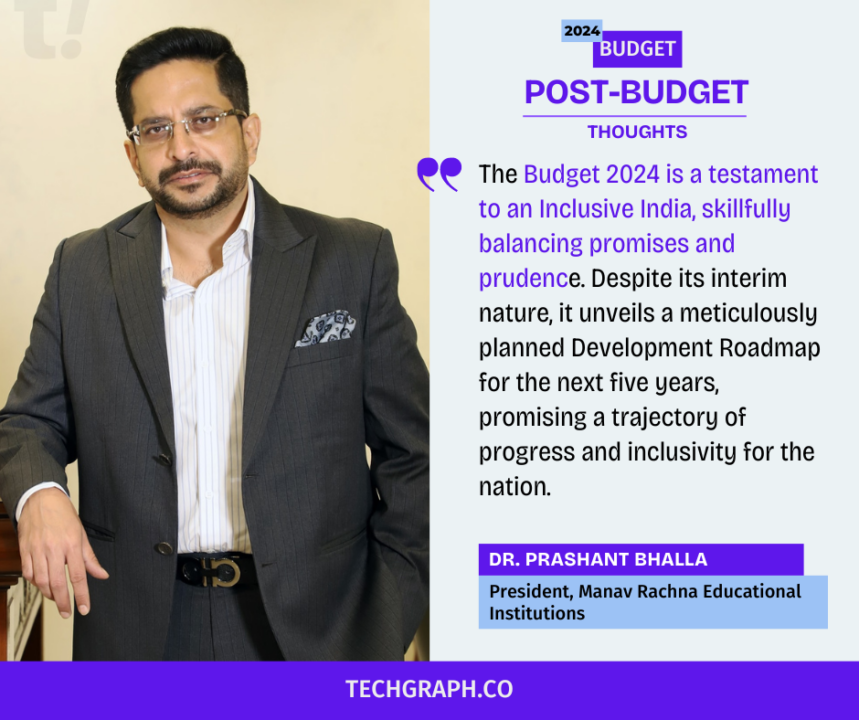
The Kartavya Kal Budget 2024 emerges as a beacon of responsibility, spotlighting the empowerment of four key stakeholders: the Poor, Yuva (Youth), Women, and Farmers. The Finance Minister passionately delved into strategies for their upliftment, placing a paramount emphasis on skills enhancement and robust capacity frameworks. In a transformative move, the Finance Minister highlighted the National Education Policy (NEP) 2020 as a catalyst for revolutionizing the education sector. A noteworthy increase in the budget allocation for the Pradhan Mantri Shiksha Vikas Yojana (PMSHRI) from 4000 crores to 6050 crores was announced, poised to significantly enhance the education infrastructure.
Under the Skill India mission, a commendable achievement was unveiled – the skilling of 1..4 crore youth, marking a significant stride toward a skilled and empowered workforce. The Budget not only sets new benchmarks but also paves the way for a progressive future.
In line with the vision of ‘Jai Vigyan Jai Anusandhan,’ a groundbreaking announcement unfolded: the establishment of an Innovation Foundation with a substantial corpus of Rs. 1 lakh crore. This visionary move includes provisions for a 50-year interest-free loan with a low or nil interest rate, enticing the tech-savvy private sector to actively contribute to the realization of ‘Viksit Bharat’ by 2047.
The Budget 2024 is a testament to an Inclusive India, skillfully balancing promises and prudence. Despite its interim nature, it unveils a meticulously planned Development Roadmap for the next five years, promising a trajectory of progress and inclusivity for the nation.
Nischal Narayanam, Founder & Mentor, Nischal’s Smart Learning Solutions
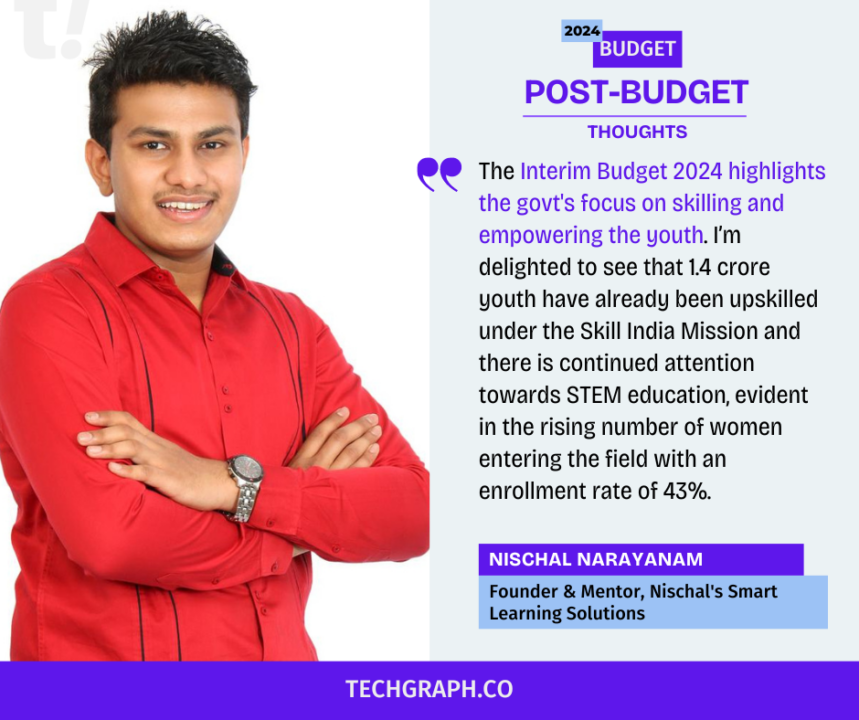
The Interim Budget 2024 highlights the government’s focus on skilling and empowering the youth. I’m delighted to see that 1.4 crore youth have already been upskilled under the Skill India Mission and there is continued attention towards STEM education, evident in the rising number of women entering the field with an enrollment rate of 43%. While upskilling programs were mentioned, I believe strengthening initiatives to establish more institutions like RIE for teacher training can significantly amplify the impact. By investing in RIE-like institutions and empowering our teachers, we can create a strong schooling system that fosters innovation, and critical thinking, and prepares our youth for future challenges. We remain hopeful that our government will prioritize this in the future and allocate funds to broaden robust training modules aligned with industry demands and emerging technologies.
Parag Goel, Chief Business Officer, eduXLL
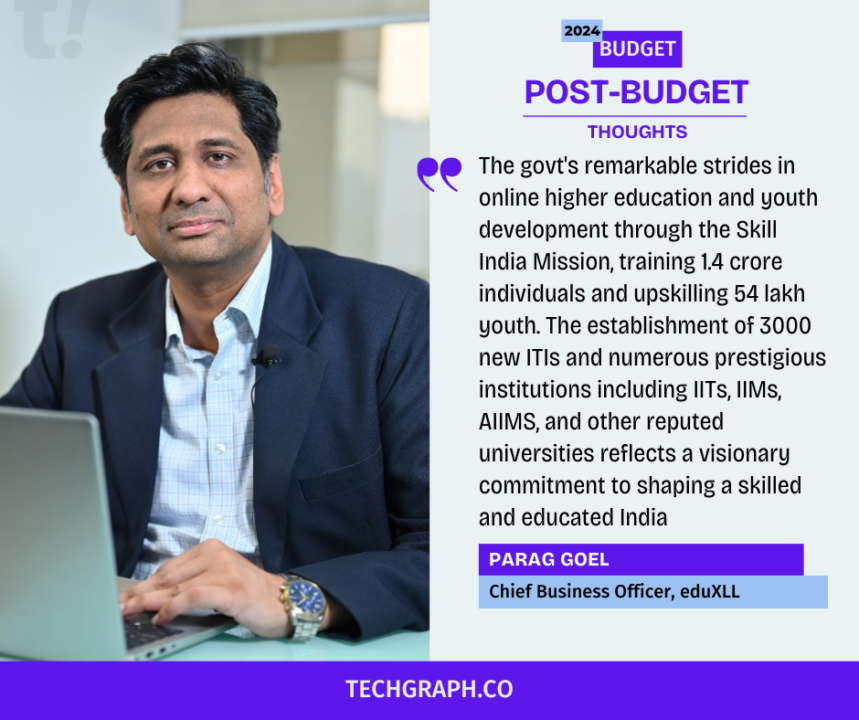
The government’s remarkable strides in online higher education and youth development through the Skill India Mission, training 1.4 crore individuals and upskilling 54 lakh youth. The establishment of 3000 new ITIs and numerous prestigious institutions including IITs, IIMs, AIIMS, and other reputed universities reflects a visionary commitment to shaping a skilled and educated India. Additionally, tax benefits for startups foster an environment conducive to growth.
Archana Sinha, Co-founder & CEO, Nourishing School Foundation
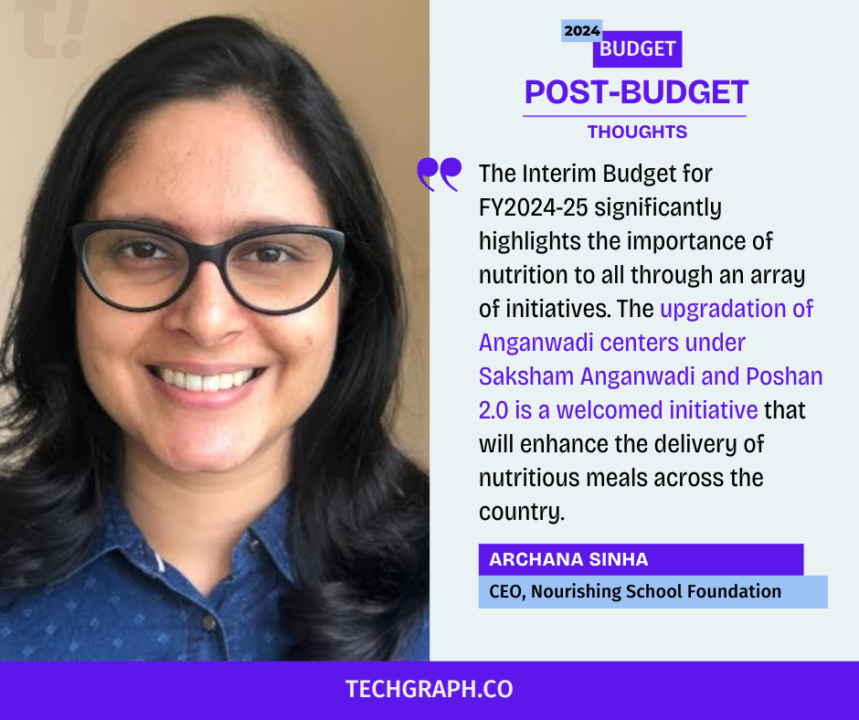
The Interim Budget for FY2024-25 significantly highlights the importance of nutrition to all through an array of initiatives. The upgradation of Anganwadi centers under Saksham Anganwadi and Poshan 2.0 is a welcomed initiative that will enhance the delivery of nutritious meals across the country.
However, it is crucial to note that despite such fervent efforts to promote nutrition, there remains a lack of understanding regarding the importance of nutrition – according to a survey, over 85% of Indians are unaware of vegetarian sources of protein. Additionally, the National Family Health Survey indicates that India still faces a double burden of malnutrition in both urban and rural areas – through the coexistence of undernourishment with the prevalence of overweight/obesity in the population.
While there are several efforts underway to ensure accessible and affordable nutrition to all, it becomes all the more pivotal to improve nutrition education across the country to not only enhance self-sufficiency but also reduce India’s burden of non-communicable diseases among the future generations of India’s young adults and workforce.
Amit Saneja, CEO, Educate Online
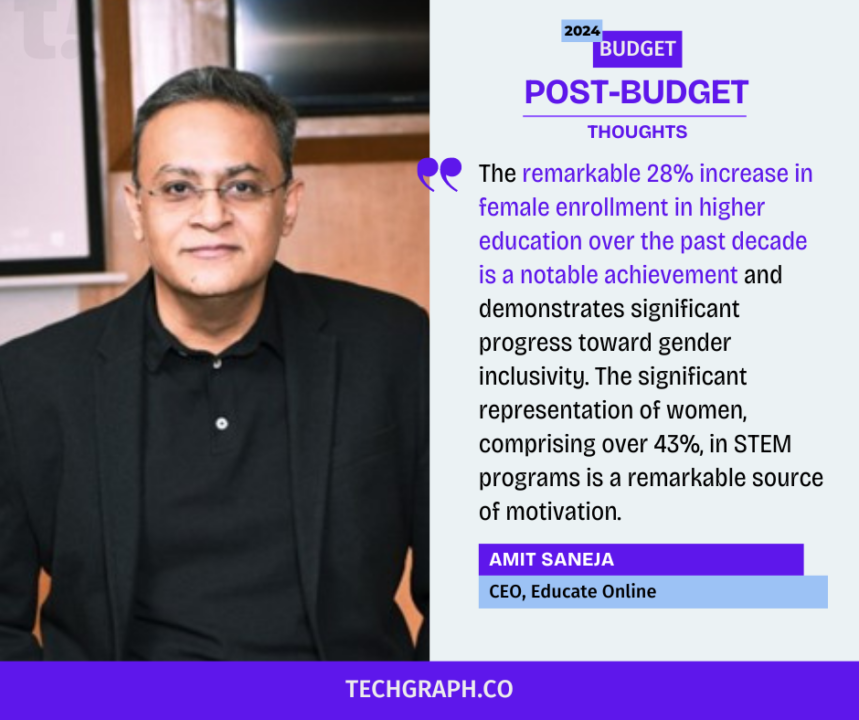
We are pleased to witness that the outlook of Budget 2024 is in line with the Government’s pledge to make India a ‘Viksit Bharat’ by 2047. The inclusive approach, symbolized by the motto ‘sabka sath, sabka vikas,’ is a crucial step towards holistic development. The National Education Policy 2020 has brought about transformative changes, and the world can witness the government’s unwavering commitment to education.
The remarkable 28% increase in female enrollment in higher education over the past decade is a notable achievement and demonstrates significant progress toward gender inclusivity. The significant representation of women, comprising over 43%, in STEM programs is a remarkable source of motivation. This serves as a stepping stone for better job opportunities for them and also acts as a driving force to inspire numerous others.
The education industry eagerly anticipates harnessing these advancements as the budget opens doors for a robust and progressive education system. This seamlessly aligns with our organizational values of empowering Indian students to excel at an international level and exceeding their potential. It truly embodies our dedication to promoting equality and outstanding education on a global platform.
Piyush Arora, Professor of Practice, UPES Online
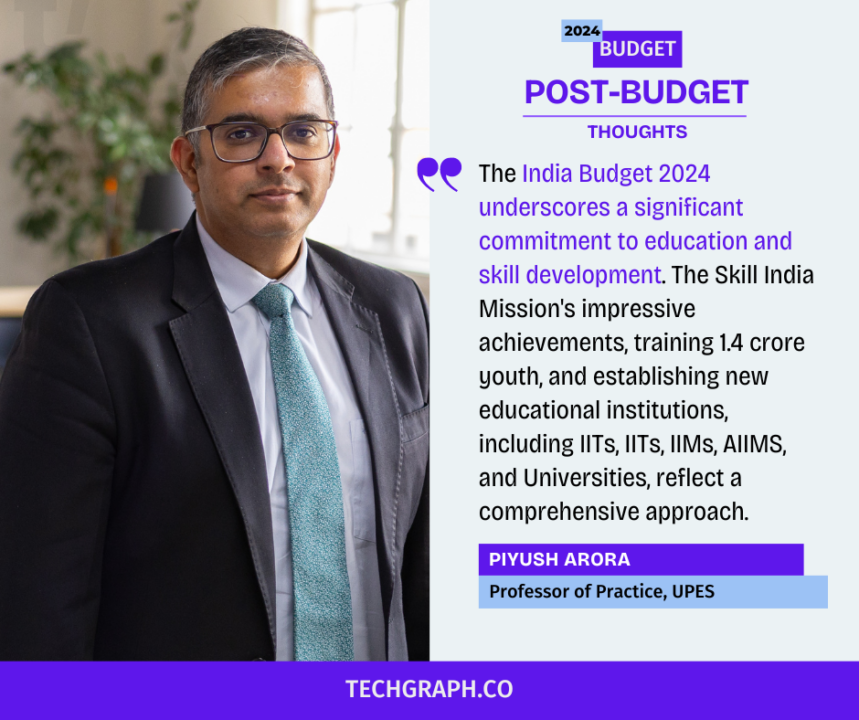
The India Budget 2024 underscores a significant commitment to education and skill development. The Skill India Mission’s impressive achievements, training 1.4 crore youth, and establishing new educational institutions, including IITs, IITs, IIMs, AIIMS, and Universities, reflect a comprehensive approach.
The vision to make India a ‘Vikashit Bharat’ by 2047 is commendable, aligning with the Skill India Mission’s success in increasing average income by 50%. The emphasis on higher education, coupled with the rise in women’s enrolment in STEM courses, is pivotal for fostering a skilled and inclusive workforce. As an EdTech company, we appreciate the focus on education, and we look forward to contributing to the nation’s progress through innovative learning solutions.
Nitin Godawat, Managing Director, CREST Olympiads
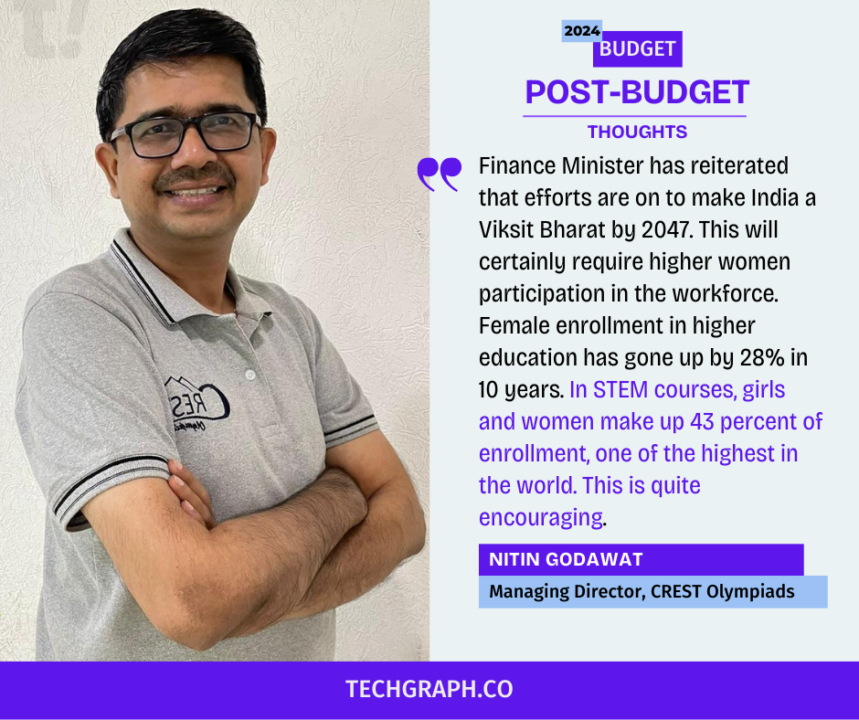
FM Nirmala Sitharaman has reiterated that efforts are on to make India a Viksit Bharat by 2047. This will certainly require higher women participation in the workforce. Female enrollment in higher education has gone up by 28 percent in 10 years. In STEM courses, girls and women make up 43 percent of enrollment, one of the highest in the world. This is quite encouraging. More medical colleges will be set up while using the existing infrastructure of hospitals across various departments.
Since this was an Interim budget, no major announcements have been made. In the main budget later this year, we hope that the school education budget will continue to increase and the provisions will align with the goals of NEP 2020. We would also like special provisions for improvement in Research and Development, Mental Health Support, Teacher Training, Tech-enabled Student Learning, and Skill Development and Vocational Training.



